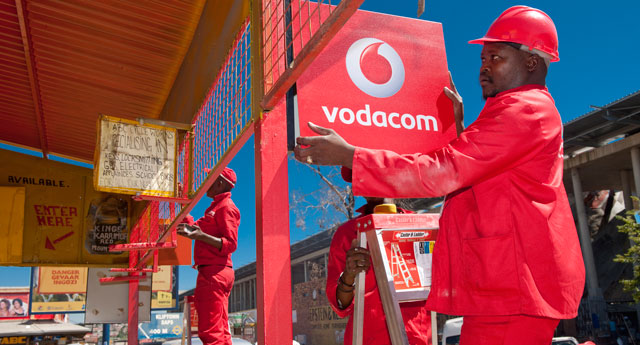
A shake-up of the telecommunications landscape in Africa may be in the offing after US giant AT&T said in an interview with Bloomberg that it was interested in acquiring UK-listed Vodafone.
AT&T said, though, that it was not interested in acquiring Vodafone’s operations in emerging markets, but only its European operations.
It is not clear if AT&T is referring to the Africa, Middle East and Asia-Pacific operations, which are currently grouped together under Vodafone’s structure when it talks of emerging market operations.
This region includes Australia, India, Fiji, Ghana, Egypt, Kenya, New Zealand and Qatar and the 65% stake which Vodafone has in JSE-listed Vodacom, which includes operations in Tanzania, Mozambique, Lesotho and the Democratic Republic of Congo.
Vodacom is 65% owned by Vodafone, with the South African government and the Public Investment Corporation holding 17% between them and the rest held by small investors.
Several scenarios suggest themselves should Vodafone’s emerging market operations be sold off.
One would be for Vodacom to buy the majority stake in its own operation from Vodafone and perhaps Vodafone’s Kenyan and two other African operations.
It is likely to face opposition, though, from other potential buyers — Orange, América Móvil and China Mobile. Orange has already expressed an interest in both Vodacom and Kenya.
Analysts say Vodacom is sufficiently capitalised to be able to acquire Vodafone’s African operations.
It has bank and cash balances of R6,5bn and free cash flow of R12bn. In the Bloomberg interview, AT&T suggested that all the emerging market operations might be placed in one entity and sold to a single buyer.
There would most certainly be buyers for individual entities. French company Orange has already told Bloomberg that it would be interested in buying Vodacom and Kenya’s Safaricom.
Analysts in South Africa feel that Vodacom has both the leadership and the cash flow to break away from Vodafone and to bid for some of its operations in Africa.
Some feel that freeing Vodacom from a partnership that has kept it as a largely South African company, while its local competitor MTN has been free to expand into the rest of Africa, would be to its advantage in the long term.
The question is whether Vodacom could afford, or be able to obtain, funding for deals outside Africa.
Abdul Davids, chief researcher at Kagiso Asset Management, said it would make sense with a deal of this nature for Vodafone to allow Vodacom to buy its other African operations and then for AT&T to sell the combined, and much more valuable, entity.
“It might offer the African assets to Vodacom to clear up the structure. It would make it a much more attractive target for a company like China Mobile,” he said.
“Of course, AT&T might decide to retain Vodacom, which is making substantial contributions to revenue, and sell off its other emerging market holdings.”
Davids said Vodacom could also theoretically go it alone. “It is sufficiently cash-flush and while it does have some debt [it has the] money necessary for upgrades required for LTE [long-term evolution]. It can also use the cash from a successful operation like Vodafone Egypt to fund that acquisition rather than using its own money. It all depends on how the deal is structured.”
Dominic Cull, a telecoms regulatory expert at advisory company Ellipsis, said: “If Vodacom had to go it alone, it would have some latitude to pursue its own interests. South Africa, where it is largely based, is not exactly exciting. Voice revenue is down, while data revenue is increasing — but you might not be able to get spectrum for the next two to three years to take advantage of this demand.”
Richard Hurst, senior analyst at Ovum, said the inquiry by AT&T seems to be “very speculative”.
“In terms of branding, it is likely that Vodacom will have first option to acquire these assets. However, whether Vodacom is in a position to take up these assets is another matter.”
Vodafone has indicated that its plans involve expansion into Africa. This has led to speculation by market analysts that the deal would not be welcomed by Vodafone.
But in the end it boils down to what shareholders view as a good deal. Vodafone and Vodacom declined to comment, but a source close to Vodacom said the news has come as a surprise to the company. — (c) 2013 Mail & Guardian
- Visit the Mail & Guardian Online, the smart news source




